Brexit has ‘limited growth, restricted trade, increased food costs and diminished opportunities’, says Scottish government
To mark the anniversary of the Brexit vote, the Scottish government has published a short paper on the impact of leaving the EU on Scotland. Scotland voted remain by 62% to 38%, making it the most pro-remain of the four nations of the UK, and the SNP, which wants an independent Scotland to rejoin the EU, has criticised Brexit more strongly than any other party in the UK.
In its paper, the Scottish government does not identify any advantages from Brexit at all. The section headings give a good sense of the overall verdict.
Democratic impact
A poorer nation
A cost of living crisis
Increased costs to business and damaged trade
Additional costs and red tape for our fishing and agriculture industries
Freedom of movement has gone
Travel is more difficult and costly
Missed youth opportunities
Lost funding
Cutting-edge research halted
Commenting on the report, Angus Robertson, the Scottish government’s constitution secretary, said Brexit had “limited economic growth, restricted trade, increased food costs and diminished opportunities for young people”. He said:
Brexit means Scotland has now left the world’s biggest single market and no longer enjoys freedom of movement, resulting in labour shortages across the NHS, agriculture, and our hospitality sector. Consumers and businesses continue to face a cost of living crisis driven by rampant food inflation, while produce rots in the ground, and obstructive trade barriers that are making it harder to import and export goods from the EU.
Scotland’s rural and research sectors have lost out on hundreds of millions of pounds worth of EU funding, which the UK government has been unable to match. A generation of young Scots have been deprived of life-changing exchange opportunities to study abroad.
While we will continue to do all we can to mitigate this damage through our long-standing ties with European neighbours, the fact remains that the only way to meaningfully reverse this damage and restore the benefits Scotland previously enjoyed, is for an independent Scotland to re-join the European Union.
Key events
-
Dissatisfaction with government at near record levels, with 80% of people unhappy at how it’s running country, poll suggests
-
Mortgage holders to get 12-month grace period before repossessions, Hunt says
-
Economic damage done by Brexit ‘undeniable’, says thinktank
-
Hunt says banks will let customers temporarily renegotiate mortgage terms without credit scores being downgraded
-
No 10 says announcement of five-day strike by junior doctors in England ‘extremely disappointing’
-
No 10 defends independence of Bank of England as it faces criticism from Tory MPs
-
Boris Johnson attacks ‘prophets of doom’ on anniversary of Brexit vote, claiming it has delivered ‘all kinds of benefits’
-
Brexit has ‘limited growth, restricted trade, increased food costs and diminished opportunities’, says Scottish government
-
Junior doctors in England to strike for five days from 13 July
-
Bank bosses say their meeting with Hunt about mortgages ‘very productive’
-
Case for rejoining single market alone may be weaker than case for rejoining EU, says thinktank
-
Four out of five Britons want closer relationship with EU, poll says on anniversary of Brexit vote
Dissatisfaction with government at near record levels, with 80% of people unhappy at how it’s running country, poll suggests
Dissatisfaction with the the government is close to record levels, Ipsos, the polling firm, says.
In its latest political monitor, it highlights figures showing that 80% of people are dissatisifed with the way the government is running the country (up from 76% in May) and only 12% are satisfied (down from 15% in May). That makes a net satisfaction score of -68 (down from -61 in May).
Ipsos says this in effect puts Sunak in the same league as Liz Truss. Truss’s government achieved a net satisfaction rating of -69 shortly before she resigned.
Since 1979 the only governments that have performed worse on this measure have been John Major’s between 1992 and 1995, and Theresa May’s in 2019 – also shortly before she resigned.
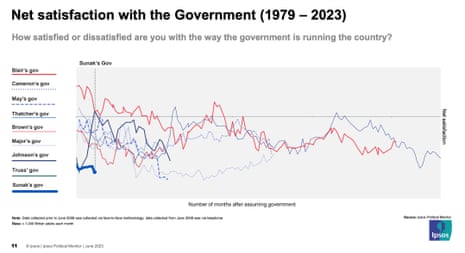
On voting intention, Ipsos has Labour on 47% (up 3 points from May), and the Conservatives on 25% (down three points), making a lead of 22 points (up 6).
Mortgage holders to get 12-month grace period before repossessions, Hunt says
The banks have also agreed that people should be given a 12-month grace period before repossession proceedings start, Jeremy Hunt, the chancellor, said. Julia Kollewe has more details on the business live blog.
Economic damage done by Brexit ‘undeniable’, says thinktank
Boris Johnson claims Brexit has delivered “all kinds of benefits”. (See 12.16pm.) But most economists argue that its economic impact has been negative, and there are three charts in today’s report from the Tony Blair Institute highlighting this. The report says the economic damage done by Brexit is “undeniable”.
Growth
Since Brexit, growth has slowed compared to other G7 countries, the report says. It says:
When assessing the performance of the UK economy since the 2016 referendum, it is evident that it has done worse than any other G7 economy, including the EU27. Gross domestic product (GDP) per capita in the UK has grown the slowest among G7 economies since 2016. While this grim performance cannot be fully attributed to the decision to leave the EU, Brexit is the only major factor that distinguishes the UK from other countries in this comparative set.
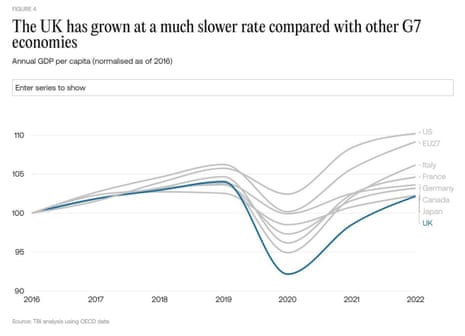
Trade openness
Trade has also suffered, the report says. It evaluates this by looking at “trade openness” – the ratio of trade relative to GDP. It says:
Before Brexit, the UK had one of the most open economies among G7 countries but is now at the bottom of this group, having experienced a more significant drop in trade openness and recovered more slowly than other economies. As was the case in other countries, the Covid-19 pandemic has adversely affected trade and supply chains, but the magnitude of the UK’s drop suggests that higher trade barriers caused by the departure from the single market have been one of the main drivers of this underperformance.
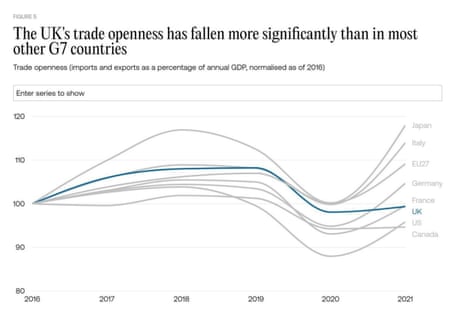
Investment
And investment has also been hit, the report says. It says:
Although business investment had been growing steadily since the 2008 financial crisis, this was abruptly knocked off course at the time of the 2016 referendum. Today, business investment in the UK is estimated to be 31 per cent below the pre-referendum trend. In the EU, by contrast, business investment is currently 2 per cent above its pre-2016 trend. However, the different ways in which investment has been hit in the UK and the EU cannot be solely attributed to Brexit, not least because the impact of the Covid-19 pandemic varied in severity.
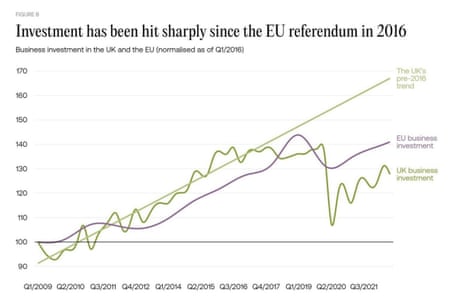
Hunt says banks will let customers temporarily renegotiate mortgage terms without credit scores being downgraded
The banks have agreed that people who renegotiate the terms of their mortgage on a temporary basis will not have to worry about having their credit scores downgraded, Jeremy Hunt has said.
Speaking about the outcome of his meeting this morning with lenders, the chancellor told broadcasters:
We agreed some very important things for people who are worried about their rates going up, not just people who are in an extreme situations.
The most significant thing is that they can pick up the phone to their bank or their mortgage lender and talk about their situation without any worry that it will impact their credit score.
And if they decide to make their payments easier by extending the period of their mortgage, or by going to an interest-only package, they can go back to their original package without any questions, without any impact on their credit score, within six months.
That’s the reassurance that people like Martin Lewis [the consumer champion] had been saying will make a big difference for families in those situations.
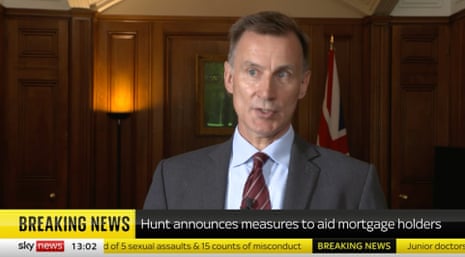
Keir Starmer has said people want “action, not words” from ministers on rising mortgage rates.
Speaking to broadcasters on a visit to RAF Brize Norton in Oxfordshire, Starmer said there were going to be “many mortgage holders, many families, across the country who are now even more worried about paying their mortgage”. He went on:
They know that the government’s been about for 13 years, they know the Government crashed the economy last year.
What they want, I think, is a much stronger sense that the government is gripping this; action, not words.
Labour says lenders should be forced to offer customers the option of temporarily switching to interest-only payments, or extending the repayment period, if they struggling to meet their monthly payments.
No 10 says announcement of five-day strike by junior doctors in England ‘extremely disappointing’
At the morning lobby briefing Downing Street also said that the announcement of a five-day strike by junior doctors in England was “extremely disappointing”. Asked if Rishi Sunak was concerned about the development, the PM’s spokesperson said:
Yes. It puts patient safety and our efforts to cut the waiting lists at risk. It’s obviously extremely disappointing.
In the meeting government had with junior doctors we made a fair and reasonable opening offer, and we were discussing both pay and non-pay issues. But they chose to end the talks by announcing new strike dates.
Obviously, if they cancel the damaging and disruptive strikes and show willingness to move away from their starting positions and find a way forward, then will be able to proceed with those discussions.
No 10 defends independence of Bank of England as it faces criticism from Tory MPs
Downing Street has defended the Bank of England’s independence but declined to criticise the Tory MPs who have been condemning its handling of inflation, PA Media reports.
Speaking at the lobby briefing this morning, the PM’s spokesperson said:
They are rightly independent. Obviously, people are able to express their view, that’s right in a free society.
For our part, we recognise it is rightly the independent Bank of England that sets monetary policy and the monetary policy committee are responsible for that.
We will work in lockstep with them where appropriate so that we work in the interest of the public by bringing inflation down.
Jacob Rees-Mogg, the GB News presenter and former business secretary, is one of the Tories most critical of the Bank. He posted this on Twitter this morning.
Boris Johnson attacks ‘prophets of doom’ on anniversary of Brexit vote, claiming it has delivered ‘all kinds of benefits’
Boris Johnson has chosen to mark the anniversary of the Brexit vote by posting a message on Twitter claiming it has delivered “all kinds of benefits” and dismissing its critics as “the prophets of doom”.
Happy Independence Day folks! Remember Brexit has already helped deliver all kinds of benefits – from new free trade deals to the fastest vaccine roll out in Europe. We are doing things differently – from genomic editing to regulation of financial services. 🧵1/3
— Boris Johnson (@BorisJohnson) June 23, 2023
We have been able to take a stronger line in foreign policy – from AUKUS to Ukraine. We chose a bold new destination for our country and it has paid off and will pay off hugely as time goes on. Don’t listen to the prophets of doom. 🧵2/3
— Boris Johnson (@BorisJohnson) June 23, 2023
They said Brexit would lead to mass unemployment. They said millions would be thrown out of work. They were ludicrously wrong then and they are wrong now. Don’t let them get you down – believe in this country and what it can do. 🧵3/3
— Boris Johnson (@BorisJohnson) June 23, 2023
As usual, much of what he is saying is misleading or downright false. Brexit was not the reason for the UK having the fastest initial vaccine rollout in the EU. Being in the EU never stopped the UK having an independent foreign policy (Johnson has forgotten the Iraq war). And, while remain campaigners did argue that Brexit would lead to job losses, they never seriously predicted that “millions would be thrown out of work”.
Brexit has ‘limited growth, restricted trade, increased food costs and diminished opportunities’, says Scottish government
To mark the anniversary of the Brexit vote, the Scottish government has published a short paper on the impact of leaving the EU on Scotland. Scotland voted remain by 62% to 38%, making it the most pro-remain of the four nations of the UK, and the SNP, which wants an independent Scotland to rejoin the EU, has criticised Brexit more strongly than any other party in the UK.
In its paper, the Scottish government does not identify any advantages from Brexit at all. The section headings give a good sense of the overall verdict.
Democratic impact
A poorer nation
A cost of living crisis
Increased costs to business and damaged trade
Additional costs and red tape for our fishing and agriculture industries
Freedom of movement has gone
Travel is more difficult and costly
Missed youth opportunities
Lost funding
Cutting-edge research halted
Commenting on the report, Angus Robertson, the Scottish government’s constitution secretary, said Brexit had “limited economic growth, restricted trade, increased food costs and diminished opportunities for young people”. He said:
Brexit means Scotland has now left the world’s biggest single market and no longer enjoys freedom of movement, resulting in labour shortages across the NHS, agriculture, and our hospitality sector. Consumers and businesses continue to face a cost of living crisis driven by rampant food inflation, while produce rots in the ground, and obstructive trade barriers that are making it harder to import and export goods from the EU.
Scotland’s rural and research sectors have lost out on hundreds of millions of pounds worth of EU funding, which the UK government has been unable to match. A generation of young Scots have been deprived of life-changing exchange opportunities to study abroad.
While we will continue to do all we can to mitigate this damage through our long-standing ties with European neighbours, the fact remains that the only way to meaningfully reverse this damage and restore the benefits Scotland previously enjoyed, is for an independent Scotland to re-join the European Union.

On the subject of health strikes, Chris Smyth in the Times reports that next week the Royal College of Nursing is likely to announce that its strike action over pay in England is coming to an end.
The RCN has been balloting members on further strike action. Although most of those voting are backing further strikes, Smyth has been told that the union won’t meet the 50% turnout threshold required for a union strike ballot to be legally valid. Smyth reports:
“We believe that the majority of those voting are voting for strikes but we expect [the vote] not to clear the turnout hurdle,” one senior health source said.
This week, [Pat Cullen, the RCN general secretary] blamed rules requiring a postal vote for struggles to reach the threshold, urging nurses to return their ballots or see the strikes reach “the end of the road”.
Previously when the RCN held a strike ballot, it organised ballots by individual employment unit. Strikes went ahead in the places where the 50% turnout threshold was reached, but in many hospitals there were no strikes because turnout in the ballot was too low.
This time the RCN organised the ballot on an England-wide basis. As the process started Cullen denied suggestions that this format would make it harder for the ballot to succeed.
In March the RCN leadership recommended that members should accept the revised pay offer from government. But members rejected the recommendation, leading to further strike action in the spring. Nurses received the pay rise anyway after the NHS staff council, which represents most health unions, voted to accept it.
After the RCN strike in the spring a further ballot on strike action was needed because, under union law, the mandate for strike vote only remains legally valid for six months.
Junior doctors in England to strike for five days from 13 July
Junior doctors in England will strike for five days from 13 July in their longest single period of industrial action in the history of the health service, the British Medical Association has said.
The Commons liaison committee has announced that its next session with Rishi Sunak will take place on Tuesday 4 July. Sunak will take questions from the committee for 90 minutes.
Bank bosses say their meeting with Hunt about mortgages ‘very productive’
Banking bosses held a “very productive” meeting with Jeremy Hunt, the chancellor, after a shock interest rate hike deepened the mortgage crisis and threatened more pain for struggling households, PA Media reports. PA says:
Hunt met with large lenders including HSBC, Santander and Barclays in Downing Street early on Friday morning, with the government being urged to relieve the pressure.
“We had a very productive meeting. We’re doing everything we can to help customers and help with the anxieties,” NatWest boss Alison Rose said as she left the meeting. She added they were “very keen” to help everyone.
Chief executive of Lloyds Banking Group Charlie Nunn said that bosses had held a “good working discussion with the chancellor”.
Julia Kollewe has more coverage on our business live blog.
Case for rejoining single market alone may be weaker than case for rejoining EU, says thinktank
The Tony Blair Institute report – Moving Forward: The Path to a Better Post-Brexit Relationship Between the UK and the EU – includes a series of recommendations for how Britain and the EU could develop a closer trading relationship. It does not explicitly propose rejoining the single market. Instead it highlights 10, mostly technical, recommendations, that would align the UK more closely with EU regulations.
But does the EU want a closer relationship with the UK. As Anton Spisak, one of the authors of the report, highlighted on Twitter last week, the answer seems to be no. Spisak highlighted a Financial Times report quoting Stefan Fuehring, the European Commission official in charge of overseeing the trade and cooperation agreement (the post-Brexit trade deal with the UK). Fuehring told a conference recently:
There’s almost on a bi-weekly basis a report [on how to improve the existing Brexit deal] coming from the Tony Blair Institute, the UK in a Changing Europe, the House of Lords and so on. My job is to follow all these, of course, but I’m not aware that in the last two years any such report has come out of the EU system. We have really moved on now with this debate [over Brexit] and I think the next decade is one where we’ll deal with future member states, rather than a past member state.
Fuehring also said the review of the TCA due to take place in 2026 was an “implementation” review and not a moment for “revising, revisiting or renewing, let alone amending” the deal.
In its report, the Tony Blair Institute says that, although there would be advantages in rejoining the single market, rejoining the EU as a proper member might be better and more straightforward. It says:
Full membership of the EU single market could happen only in return for the UK accepting all four freedoms that are inherent to the EU – including free movement of persons – and ceding regulatory autonomy over parts of its economy, without having much decision-making power over those EU rules. If it was faced with this decision, the UK would have to consider the merits of going back into the single market versus rejoining the EU, the latter offering a similar balance of rights and obligations but with the UK given a direct seat at the table, where the rules are made and decided.
The report also says that just rejoining the single market would involve a renegotiation of the European Economic Area (EEA) agreement, which allows Norway, Iceland and Liechtenstein to be in the single market but not in the EU. This might be complicated because “the UK’s economy is approximately seven times greater than that of Norway’s, the next largest country within the single market but outside the EU, and structurally, they have very different economies”, it says.
Keir Starmer has said a Labour government would not try to rejoining the single market and the fact that the report does not include this as a recommendation is is a sign of how keen it is to promote ideas that have a chance of being implemented. In a recent column, the FT’s Robert Shrimsley said that, if Labour wins the election, the Tony Blair Institute could become the country’s most influential thinktank. Blair has “unfinished business” in terms of shaping Britain, Shrimsley concluded.
Four out of five Britons want closer relationship with EU, poll says on anniversary of Brexit vote
Good morning. Seven years ago today the United Kingdom voted in a referendum to leave the European Union. Even leave voters don’t believe it has been a success, and this morning the Tony Blair Institute has published a report that includes polling suggesting that four out of five people (78%) now want a closer relationship with the EU. Even amongst leave voters, 71% now favour a closer relationship with the EU.
The poll also suggests that 56% of people want the UK to at least rejoin the single market (with 43% favouring rejoining the EU in full, and 13% favouring just returning to the single market).
Remarkably, even among leave voters, 34% want the UK to at least rejoin the single market (with 13% favouring rejoining the EU in full, and 21% favouring just returning to the single market).

Commenting on the findings, Anton Spisak, head of political leadership at the thinktank, said:
Our polling shows that there is a large majority of the British public who recognise that Brexit in its current form isn’t working and would like to see the UK moving closer to the EU. This creates a substantial political space to move the debate forward from refighting the old battles about whether Brexit was right or wrong, to discussing what an improved future relationship with the EU should look like.
The EU will always remain a key strategic ally, and it is absurd that the bloc has deeper trading arrangements with Israel and Georgia, better regulatory recognition on food-safety standards with Canada and New Zealand, and deeper mechanisms for political cooperation with nations including Australia and Japan.
Any future British government that wants to improve the relationship with the EU will need a carefully considered strategic plan – and make a clear-eyed offer to the other side. Asking the EU nicely cannot succeed as a negotiating strategy.
To mark the anniversary, there is quite a lot of other Brexit news around, including polling showing that the proportion of Britons who want to rejoin the EU has climbed to its highest levels since 2016. Jon Henley and Michael Goodier have the details here.
Otherwise, the political news fountain is running a bit dry today. But Jeremy Hunt, the chancellor, has been meeting lenders to discuss the mortgage crisis. Julia Kollewe is covering this on the business live blog.
If you want to contact me, do try the “send us a message” feature. You’ll see it just below the byline – on the left of the screen, if you are reading on a PC or a laptop. This is for people who want to message me directly. I find it very useful when people message to point out errors (even typos – no mistake is too small to correct). Often I find your questions very interesting too. I can’t promise to reply to them all, but I will try to reply to as many as I can, either in the comments below the line, privately (if you leave an email address and that seems more appropriate), or in the main blog, if I think it is a topic of wide interest.

